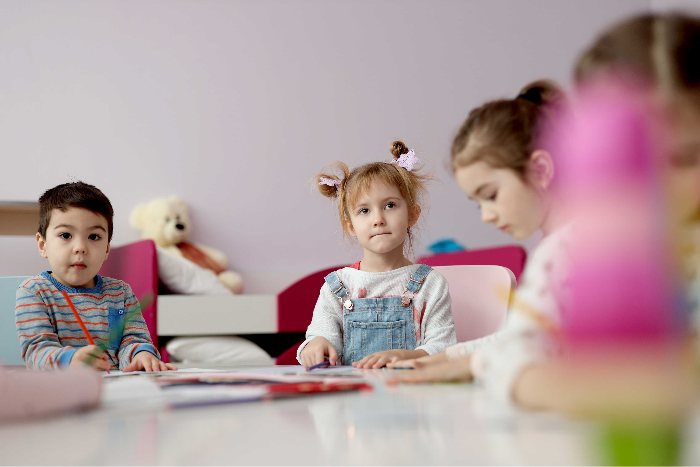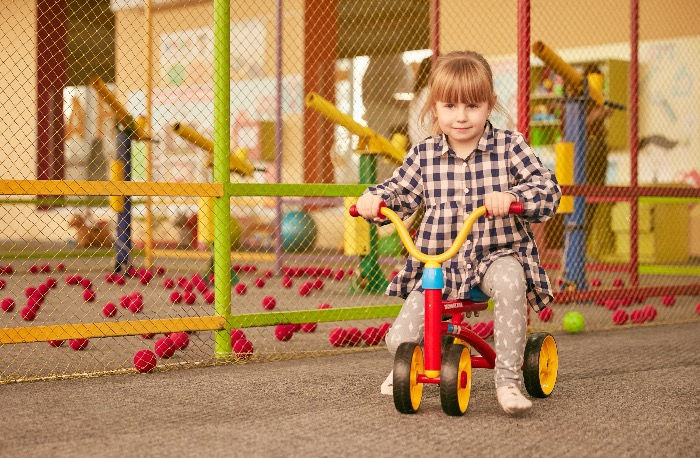The 5 most common educational concepts and what is a Montessori kindergarten?
- Kita-Job Agentur
- Apr 30, 2024
- 10 min read
As an educator, you face the important task of promoting the education and development of your students every day. Choosing the right educational concept can have a decisive influence on the learning process and the individual needs of the children. In your professional career, you have probably already learned about and experienced various educational approaches. But in today's educational landscape, it can be a challenge to understand the multitude of concepts available and to choose which one best suits your educational work and the needs of the children.
In this article, we would like to explore with you the five most common educational concepts, focusing in particular on the Montessori kindergarten. Because, as you know, the Montessori approach has had a lasting impact on the world of education and offers a unique perspective on child development. We will not only look at the basics of these five concepts, but also take a closer look at the specific characteristics and principles of the Montessori concept.

Let us dive in together and deepen our understanding of these educational approaches to further strengthen our commitment to providing the best possible education and care for our children.
Importance of pedagogical concepts in child education
The role of educational concepts in child education is crucial as they serve as a guide and framework for designing a healthy and conducive learning environment. These concepts are based on sound educational theories and research findings that enable parents and educators to make informed decisions and select appropriate methods for the development of their children.
They provide a structured approach to child development, promote cognitive, social and emotional development and help to address the individual needs of each child.
Pedagogical concepts provide a basis for a holistic education that develops children's potential and provides them with the skills and values needed to succeed in today's complex world. They are therefore an indispensable tool for ensuring a healthy and balanced development of our young generation.
Introduction to the 5 most common educational concepts (Montessori, Waldorf, Reggio, Freinet, Pikler)
Are you interested in educational concepts? Then you've come to the right place! We'll look at the five most common ones.
Montessori stands for independence. Children learn by doing, with special materials.
Waldorf promotes creativity and imagination. Artistic subjects are strongly represented. Waldorf education, also known as Rudolf Steiner education, is an educational concept based on the ideas of the Austrian philosopher Rudolf Steiner.
It emphasizes the holistic development of children, focusing on the individual needs, talents and abilities of each child. Waldorf education places great emphasis on artistic and craft activities, music, movement and creative thinking. It is known for its experience-based approach, in which children gain knowledge through practical experiences and social learning.
This educational method aims to promote the personality development and social and emotional intelligence of children, while at the same time encouraging a strong respect for nature and cultural diversity. Waldorf education has a large following worldwide and is successfully used in schools and kindergartens in many countries.
Reggio Emilia relies on project work. The environment is the third educator. Reggio pedagogy is an innovative and inspiring educational method that originated in the northern Italian city of Reggio Emilia. It emphasizes the idea that children are naturally curious, creative and competent and therefore promotes a learning-friendly environment that brings out these qualities.
In Reggio education, children's interests and ideas play a central role and they are encouraged to participate actively in the learning process and to find solutions to problems independently. The method often uses artistic forms of expression such as painting, clay and music to provide children with a variety of opportunities to communicate and express their thoughts and feelings.
Reggio pedagogy also places great emphasis on cooperation between children, educators and parents to create a collaborative learning environment that promotes the individual development and creativity of each child.
Freinet pedagogy emphasizes the wealth of experience of children. Learning through action is the motto here. Freinet pedagogy is an alternative educational method based on the ideas of the French pedagogue Célestin Freinet. It is characterized by its emphasis on student-centeredness and democratic structure.
In Freinet pedagogy, students are encouraged to participate actively in class by incorporating their own interests and inclinations into the curriculum. The method places emphasis on practical experience, experiments and project work to make learning authentic and lifelike. Freinet educators encourage communication and cooperation between children and emphasize the importance of self-development, social responsibility and democracy.
This educational method stands out for its democratic structures, such as class councils/kindergarten councils and student parliaments, and gives children an active role in shaping their learning and their school environment.
Pikler is known for movement development and free play. The Pickler pedagogy, named after the Hungarian-Austrian pediatrician Emmi Pikler, focuses on early childhood development and care in daycare centers (daycare centers). This pedagogical approach places a strong emphasis on the child's autonomy and independence, especially in the first years of life.
Pikler education creates a calm and respectful atmosphere in which the carers pay attention to and respond to the children's needs and signals. Great importance is placed on ensuring that the children have the opportunity to play, discover and learn at their own pace.
The daycare environment is often minimalistic and offers children space for free movement and self-exploration. Pikler pedagogy emphasizes the importance of nurturing, building bonds and respectfully addressing the individual needs of each child in order to create a healthy, safe and supportive environment for early childhood development.
What is a Montessori kindergarten? Here, children are seen as little researchers who discover their environment themselves. Free work and respect for each child's learning rhythm are central. Sounds exciting, doesn't it?

Detailed explanation of the Montessori concept in daycare centers and its background
The Montessori concept , developed by the Italian doctor and educator Maria Montessori, is an influential educational method based on the principles of self-determination, freedom and individuality. Maria Montessori developed her concept at the beginning of the 20th century and placed great emphasis on the dignity and autonomy of the child.
The Montessori concept is based on the idea that children are naturally curious and eager to learn and should be given the opportunity to develop themselves in a prepared environment. Montessori schools and institutions create a specially designed learning environment in which children are free to choose which activities they want to pursue.
Teachers act as observers and supporters who recognize the individual needs and interests of the children and provide appropriate materials and suggestions. Montessori education places great emphasis on the development of self-confidence, social skills and a holistic education that includes not only academic knowledge but also social, emotional and practical skills.
This concept has gained worldwide recognition and is successfully used in many kindergartens and schools to promote holistic education and development of children.
The Montessori concept is also applied in day care centers (daycare centers), extending its educational principles to early childhood education. Maria Montessori herself emphasized the importance of a prepared environment for children, where they can make their own choices and learn at their own pace. In Montessori daycare centers, the rooms are carefully designed to offer a variety of materials and activities that support the development of the senses, cognitive abilities and social skills.
The teachers in Montessori daycare centers act as observers and guides who identify the needs and interests of the children and help them choose activities. This concept emphasizes the self-determination and autonomy of the children, which enables them to develop a strong sense of self-confidence and a love of learning. The background of this approach lies in the belief that early childhood education has a decisive influence on later development, and the Montessori method aims to create a solid foundation for lifelong learning and social competence.
Differences and similarities between Montessori and the other concepts
Montessori education has both differences and similarities to other educational concepts. A key difference is the emphasis on the child's self-determination and freedom, while traditional educational approaches often have more structure and teacher-centeredness. In contrast to the Montessori method, which promotes an individualized learning environment, some other concepts rely on group instruction and curricula for the entire class.
However, there are similarities in the emphasis on holistic development of the child, the promotion of social and emotional skills, and the recognition of the unique needs of each child. Both Montessori and other concepts emphasize the importance of a stimulating learning environment and the role of qualified teachers or educators to support individual development. The choice between different educational approaches often depends on the goals of the educational institution and the preferences of the parents, with each concept offering its own strengths and focuses.

What makes a Montessori kindergarten? Special features and characteristics
A Montessori kindergarten is characterized by several special features and principles that reflect Maria Montessori's educational concept. Here are some of the most important features:
1. Prepared environment : Montessori daycare centers provide a specially prepared environment tailored to the needs and interests of the children. The rooms are divided into different educational areas that provide materials and activities for different developmental levels and interests of the children.
2. Self-determination and freedom : A key feature of Montessori education is the emphasis on children's self-determination and freedom. Children choose the activities and materials they want to use and work at their own pace.
3. Self-correction and repetition : Montessori materials are designed to give children feedback on their work and provide them with the opportunity to self-correct. This promotes independent learning and independence.
4. Individual support : Montessori teachers closely observe children and provide individual support to ensure that each child's needs are met.
5. Mixed Ages : Montessori daycare centers often have children of different ages gathered in the same environment. This allows for social learning, peer support, and the opportunity to learn from older children and help younger children.
6. Connection to nature : Montessori kindergartens often place emphasis on contact with nature and promoting environmental education. They often offer gardens or natural areas where children can explore nature.
7. Emphasis on social and emotional development : In addition to academic education, Montessori education places great emphasis on the social and emotional development of children. It promotes empathy, respect and cooperation.
8. Holistic Education : Montessori concepts encompass a wide range of educational areas including mathematics, language, art, music, sensory and practical life skills to promote holistic development.
These features make a Montessori kindergarten a unique and enriching educational environment that aims to develop the individual potential and love of learning in each child.
Advantages and possible criticisms of the Montessori concept
The Montessori concept offers numerous advantages, but also has some possible criticisms:
Advantages of the Montessori concept:
1. Individualized learning: Montessori allows children to learn at their own pace and pursue their individual interests, which can lead to a deeper and more lasting education.
2. Independence: Children develop independence, self-confidence and the ability to self-regulate early on because in Montessori environments they make their own decisions and take responsibility for their education.
3. Concentration and perseverance: Montessori materials are designed to promote children's concentration and perseverance, which is crucial for their cognitive development.
4. Social skills: Montessori environments promote social skills, collaboration and empathy as children interact and learn from each other in a mixed age group.
5. Environmental awareness: Montessori education often emphasizes connection to nature and environmental education, which helps promote environmental awareness in children.
Possible criticisms of the Montessori concept :
1. Not suitable for every child: Some children may have difficulty learning in such an open and unstructured environment, especially when they need clear instructions and structure.
2. High costs: Montessori facilities can be more expensive than traditional schools or kindergartens, which may limit access for some families.
3. Lack of preparation for standardized tests: Montessori education places less emphasis on standardized testing, which can lead to disadvantages in some educational systems when students are required to take such tests later.
4. Limited availability: In some regions and countries, Montessori facilities are limited, which may limit the opportunity for families to choose this concept.
5. Criticism of implementation: The quality of a Montessori setting can vary greatly depending on the school or daycare management and the teachers. This can mean that not all Montessori environments effectively implement the principles and principles of the concept.
It is important to note that the effectiveness and suitability of Montessori education depends on several factors, including the individual needs and personalities of the children and the quality of the educational institution and teachers. The decision to choose Montessori or other educational methods should be carefully considered to find the best approach for each child.

Is a Montessori kindergarten suitable for me as a teacher?
The decision to work as a teacher in a Montessori kindergarten depends on several factors and should be well thought out. Here are some considerations that might help you decide:
1. Educational philosophy : Consider whether you align with the educational principles of the Montessori method. Montessori emphasizes child self-determination, individualization of learning, and a less structured environment. If these values and principles align with your ideas about education, Montessori may be a good fit for you.
2. Working methods : Montessori teachers often work differently than in traditional educational settings. They observe the children, offer guidance and materials, but are less teacher-centered. Consider whether you are ready to adapt your teaching methods and work in a more open and self-directed learning environment.
3. Continuing Education : In many countries, working in a Montessori setting requires specific Montessori training and certification. Consider whether you are willing to undertake this additional training.
4. The age group : Montessori education is often offered in mixed age groups. Consider whether you enjoy working with children of different ages and appreciate the challenges and benefits of this dynamic.
5. Personal preferences : Think about whether you would feel comfortable in an environment that emphasizes independence, individualization and a calm atmosphere.
6. Local Opportunities : Investigate the availability of Montessori kindergartens in your area and whether there are openings that match your qualifications and interests.
7. Experience and curiosity: If you have no experience with Montessori, you could start by reading up on this educational method and perhaps even visiting a Montessori school to learn more about it and see if it appeals to you.
Most importantly, consider your own educational beliefs and career goals and find out if Montessori is a good fit for your personality and career path. If you are inspired by the principles of Montessori education and are willing to continue your education, working in a Montessori kindergarten could be a fulfilling and enriching professional experience.
Thank you for taking the time to read our blog about the different educational concepts and the importance of carefully choosing your work environment. We hope you have gained useful insights and been inspired to find the best possible educational environment for yourself or your children.
If you enjoyed our blog and would like to receive more of our content, we would really appreciate it if you subscribe to our blog. This way you won't miss any of our future posts and you will always be up to date.
In addition, please feel free to share our blog to make your friends, family and colleagues aware of the exciting opportunities and challenges in the world of education.
If you are looking for a suitable daycare center as a workplace and need support or advice, do not hesitate to contact us . We will be happy to assist you in finding the optimal solution for your professional goals.
Thank you for your support and interest in our blog. We look forward to continuing to inform and inspire you.
Your daycare job agency
Vladislava Ivanova



Comments